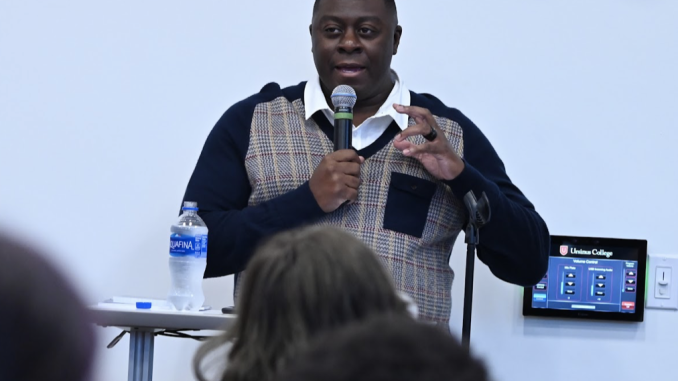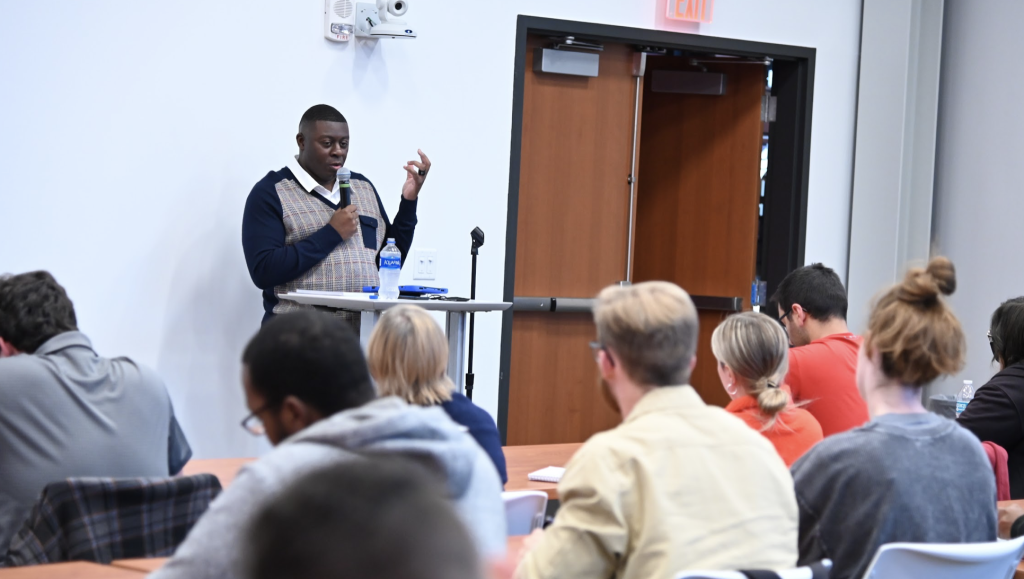
Chase Portaro (chportaro@ursinus.edu)
This past Wednesday, over 70 Ursinus community members crowded together in The Schellhase Commons to listen to award winning poet and scholar, Dr. Len Lawson. At the standing-room-only event, Lawson read selections from his three published works: Negro Asylum for the Lunatic Insane (2023, forthcoming), Chime (2019), and the chapbook, Before the Night Wakes You (2017).
Lawson was invited from South Carolina, where he teaches at Newberry College, to speak to students about his work, which is primarily concerned with understanding the Black experience through literature. More specifically, Lawson writes about his own experience as a Black man growing up in South Carolina and also about Afrofuturism, which he once described in an essay as “invading spaces with Blackness that said Black is inferior.”
In between Lawson’s busy itinerary while visiting Collegeville, I scored a chance to sit down with him and pick his brain about his journey from graduating with a BA in Business to then changing careers and becoming a published author.
This interview has been edited for length and clarity.
CP: I saw that you were a Business Administration major during undergraduate – what made you want to go into business initially?
LL: I always tell this story about having a very good high school English teacher. She got familiar with my writing, and she said, “You’d be a very good teacher, and also you should be a writer.” But coming from rural South Carolina, I’d never seen anyone do that successfully – to make a living as a writer. I decided to go with business because I thought it would be lucrative coming out of college. After graduating, I started in retail management.
CP: What was the main reason you finally decided to leave the business world and try your hand at writing and teaching literature?
LL: I was getting burnt out with the long hours. I wanted to be fulfilled rather than just bringing a paycheck home. That’s when I started to reflect, “Well, I felt the most fulfillment writing and sharing that work with other people.”
CP: Are there any skills that carry over from being a businessperson to being a writer?
LL: I think in many respects you are a business person – an entrepreneur getting your work out there and merchandising your own books. Publishing is a business field – being an editor is a business field. Those principles have stuck with me for a long time.
CP: Do you think being from the South has any affect on your poetry?
LL: That was a lot of what my doctoral research was about – trying to understand how place affects one’s poetry, and particularly poets that are from where I am from, which is South Carolina, and African American poets from there as well. So, I think place does determine a lot of different themes and ideas that writers have, and also being in what I call your place of origin, or your “homeplace.”
CP: You’ve said that you’re drawn to Afrofuturism because it creates space for Black people in places that have traditionally been all-white. I was wondering how you reflect on navigating those spaces in your childhood?
LL: When I was younger, my experience as a Black person was being in a lot of classrooms where I was one of the only, if not the only Black male in the class. As a kid, that made me think there was something wrong with my existence to where I had to conform myself to that dominant culture. But when I would go home, my neighborhood was all Black. It was awkward being at home trying to relate to the classroom, and at the same time in the classroom I was still trying to relate to being a Black person. It was awkward in both respects– the definition of W.E.B. DuBois’s ‘Double Consciousness.’
CP: How did that experience shape your perspective as an adult?
LL: After having taught at a Historically Black College in SC for a few years, and then moving on from that, it really gave me a sense of changing my mindset about Blackness. There is a pervasive culture or ideology that we have to aspire to be on the same level as whiteness, which is completely false, and nothing really centered that in my mind than not only the Trayvon Martin shooting and several others, but also right there in South Carolina with the Emmanuel Nine Massacre. A lot of that helped to unlearn or dial back how I was thinking about that as an adult.
CP: How do you think that “unlearning” affected your writing?
LL: I guess over time, that made me realize my place in my community, in my state, in this country – and why my voice is one that needs to be heard on the subject, and I guess that empowers my writing as well because I started doing more research. A lot of that helped me understand that I don’t have to aspire to be something I’m not– I just have to promote who I really am. I think that’s my experience, and I don’t need to downplay that because that’s what makes me unique. I’m not the only person to ever experience that, but I did experience it, so I bring something to the conversation of race – or any conversation really – because of my lived experiences. So adding creative writing to that helps maybe another person who has not had that lived experience to get a window into what that experience is. Poetry in general is a gateway to understanding other people’s lived experience in the human condition in a way they probably wouldn’t have learned otherwise from a textbook or just the news.

